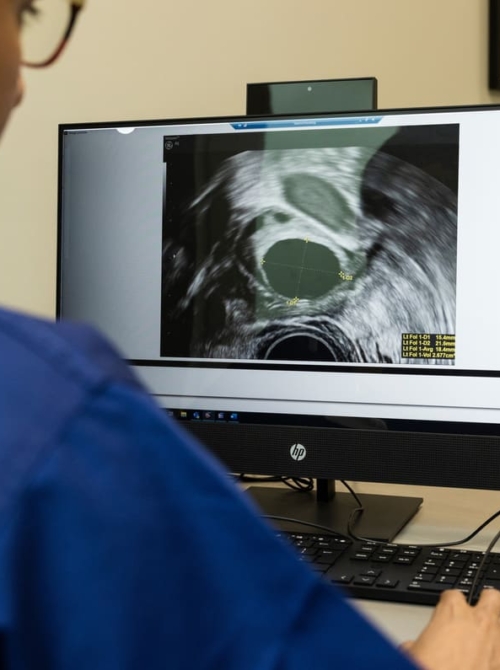How do painful or irregular periods affect your fertility?
Periods can be uncomfortable and confusing, especially when they don’t follow a regular pattern or come with pain. Many women worry about what this means for their fertility and whether these symptoms could affect their chances of getting pregnant. The good news is that painful or irregular periods don’t always signal a fertility problem, but they can sometimes point to underlying health issues worth exploring.
Dr Sevasti Koulouraki helps to explain this important topic.
Five causes of painful periods
Painful periods can have different causes, and while the list below covers some of the most common ones, it isn’t exhaustive. Understanding what might be behind your symptoms can help you know when to seek support.
1. Dysmenorrhoea (typical period pain)
Painful periods, medically known as dysmenorrhoea, are common for many women during their menstrual cycle. This pain happens because the womb contracts to shed its lining; a natural process triggered by hormone-like chemicals called prostaglandins. These contractions can cause cramping and discomfort, usually starting just before your period and easing after a day or two. While high levels of prostaglandins can make cramps feel more intense, this doesn’t mean your fertility is better or worse.
2. Polycystic Ovaries Syndrome (PCOS)
Polycystic ovary syndrome (PCOS) is a condition that affects how the ovaries work. It’s often linked to irregular periods, hormonal imbalances, and small fluid-filled sacs (follicles) that can be seen on the ovaries during a scan. If you have PCOS, you might experience fewer periods, longer cycles, or no periods at all, which can make it harder to track ovulation. While PCOS can affect fertility, many women with the condition go on to conceive with the right support and lifestyle changes.
3. Endometriosis
Sometimes, tissue similar to the womb lining can grow outside the uterus – this is called endometriosis. It can make your periods much more painful, and you might notice other symptoms like heavy bleeding or pain during sex. Endometriosis can sometimes affect fertility, so if your pain feels severe or is getting worse, it’s worth talking to your GP or a specialist.
4. Uterine fibroids
Fibroids are common, non-cancerous lumps in the womb’s muscle wall. They can cause heavier or longer periods, along with pelvic discomfort or pressure. Many women with fibroids conceive naturally, but if you’re experiencing symptoms, it’s always good to check in with a healthcare professional.
Find out more about the effect of fibroids on fertility here.
5. Pelvic infections and PID
Infections in the pelvic area, including pelvic inflammatory disease (PID), can cause pain and unusual symptoms like discharge or fever. If untreated, they might impact fertility. It’s important to see a doctor if you think you could have an infection.
Remember, painful periods aren’t something you just have to accept. If your pain is affecting your daily life or making you worried about fertility, seeking advice early can make a big difference. There are treatments and support options to help you feel more comfortable and confident about your fertility.
Understanding irregular periods and fertility
Whilst irregular menstrual periods are quite common, they can feel worrying, especially if you’re trying to conceive. But what exactly do irregular periods mean, and how do they affect your fertility?
What are irregular menstrual periods?
Irregular periods can include:
- Cycles that come too close together or are far apart
- Periods that vary in length or flow
- Missing periods altogether
How do irregular periods affect fertility?
Your menstrual cycle is closely linked to ovulation – the release of an egg from your ovaries. If your periods are irregular, it might mean ovulation isn’t happening consistently. Without regular ovulation, it can be harder to get pregnant.
However, irregular periods don’t always mean you’re not ovulating. Some women with irregular cycles still ovulate, while others with regular periods may experience ovulation issues.
If tests show you’re not ovulating regularly, your fertility specialist might recommend ovulation induction – a treatment that uses medication to help stimulate the ovaries and encourage the release of an egg. It’s a well-established approach that can help regulate your cycle and improve your chances of conceiving.
What causes irregular periods?
Several factors can influence your cycle and fertility, including:
- Stress or lifestyle changes
- Weight fluctuations
- Conditions like polycystic ovary syndrome (PCOS)
- Hormonal imbalances
What can you do?
Keeping track of your menstrual cycle and any symptoms can help you understand your body better. If you notice significant irregularity or have concerns about fertility, speaking to a healthcare professional is a good next step.
Many causes of irregular periods can be treated or managed, helping improve your chances of conceiving when you’re ready.
How to get pregnant with irregular periods
Trying to conceive with irregular periods can feel frustrating, but it’s important to remember that many women with irregular cycles do go on to have healthy pregnancies.
Track your cycle carefully
When your periods aren’t predictable, tracking ovulation becomes even more helpful. You can try:
- Ovulation predictor kits (OPKs): These test hormone levels in your urine to signal when you’re most fertile.
- Basal body temperature charting: Measuring your temperature each morning can help identify ovulation patterns over time.
- Cycle tracking apps: These can help you record symptoms and predict fertile windows based on your data.
Maintain a healthy lifestyle
Your overall health can also impact your menstrual cycle and fertility. Eating a balanced diet, keeping active, managing stress, and avoiding smoking or excess alcohol all support reproductive health. Maintaining a healthy weight is especially important, as both underweight and overweight can affect ovulation. Small lifestyle changes can make a significant difference.
When should you see a fertility specialist?
If you’ve been trying to conceive for six months to a year without success, it’s a good time to seek specialist advice, especially if you’re over 35 or have known health issues.
Also, if your periods are very painful, extremely irregular, or you have other symptoms like heavy bleeding or pelvic pain, seeing a gynaecologist can help identify any underlying conditions.
Early assessment means any potential problems can be addressed sooner, improving your chances of a healthy pregnancy. Remember, seeking help is a positive and proactive step, and specialists are there to support you through every stage of your fertility journey.
Discover more about the signs that you might need a fertility review.
How The Evewell can help
At The Evewell, we understand how stressful and confusing fertility challenges can feel. Our experienced team offers personalised consultations to explore your menstrual health, fertility concerns, and overall well-being in a compassionate and non-judgmental environment.
We provide expert testing, tailored treatment plans, and access to the latest fertility treatments, ensuring you receive care that suits your unique needs. Whether you’re just starting to explore your fertility or have been trying for a while, we’re here to support you with clear information, empathy, and expert guidance every step of the way.
All Categories
Discover more
Frequently asked questions
Painful periods are common and usually not a sign of something serious. Many women experience discomfort due to natural contractions of the uterus during menstruation. However, if your pain is severe, worsening, or interfering with your daily life, it’s important to speak to a healthcare professional.
Yes, it is still possible to get pregnant with irregular periods. Irregular cycles can make it harder to predict ovulation, but many women with irregular periods conceive naturally. Tracking your cycle closely and seeking medical advice if you’re struggling can improve your chances.
Irregular periods don’t necessarily affect the health of your pregnancy once you’re pregnant. However, they can sometimes indicate underlying hormonal imbalances or conditions that might need managing before or during pregnancy. That’s why it’s a good idea to have any irregularities checked by a healthcare provider, especially if you’re planning to conceive.
Yes, lifestyle factors like stress, diet, exercise, and sleep can all impact your menstrual cycle. Making positive changes – such as managing stress, eating a balanced diet, maintaining a healthy weight, and getting regular gentle exercise – may help regulate your periods over time.
If you’ve been trying to conceive for six months to a year without success, it’s a good idea to speak to a healthcare professional about fertility testing. You should consider testing sooner if you’re over 35, have known health conditions like painful or irregular periods, or if you’ve had previous fertility issues.





